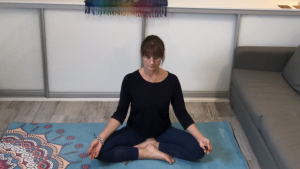7 Days of Meditation
Why Meditate….
New Research into the human brain published in July 2020 by a team of psychology experts in Canada, suggests that the average human will typically have more than 6,000 thoughts in a single day – how incredible is that?
Sadly, during these times of uncertainty, many of those thoughts may well be of the anxious variety and finding strategies to calm or settle those thoughts may well prove invaluable in helping us to manage our responses to stress and general emotional health and well-being.
“Between stimulus and response there is a space. In that space is our power to choose our response. In our response lies our growth and our freedom”
– Viktor E Frankl
In mindfulness meditation we are learning how to pay attention to the breath as it goes in and out, and notice when the mind wanders from this task. This practice of returning to the breath builds the muscles of attention and mindfulness.
When we pay attention to our breath, we are learning how to return to, and remain in, the present moment – to anchor ourselves in the here and now, without judgment.
Meditation can help to provide some much-needed space in the mind and that may be all that we need to make better choices for ourselves. The beauty of meditation is that it is simple to learn and involves some fairly straightforward techniques – with the most important tools for practice being patience, self kindness and a comfortable place to sit.
In meditation we are not seeking out a process that magically wipes the mind clear of the countless and endless thoughts that erupt and ping constantly in our brains – we are aiming for mindfulness. We are not looking to control our thoughts – just looking for ways to stop our thoughts from controlling us.
In a basic practice we are aiming to bring attention to the breath, and then back to the breath when we notice our attention has wandered.
Try this….
Get comfortable and prepare to sit still for a few minutes. Prepare to simply focus on your own natural inhaling and exhaling of breath.
Focus on your breath. Where do you feel your breath most? In your belly? In your nose? Try to keep your attention on your inhale and exhale.
Follow your breath for two minutes. Take a deep inhale, expanding your belly, and then exhale slowly, elongating the out-breath as your belly contracts.
What happened? How long was it before your mind wandered away from your breath? Did you notice how busy your mind was even without consciously directing it to think about anything in particular? Did you notice yourself getting caught up in thought? We often have little narratives running in our minds that we didn’t choose to put there, like: “I don’t have time to sit still, I’ve got so much to do.” “What time was that delivery due?” “What shall I cook for supper?”
Through the practice of mindfulness we can learn how to recognise when our minds are running riot and learning to take a pause for a little while, to calm the internal chatter and choose what we would like to focus on – it helps us to have a much healthier relationship with ourselves and by extension, with others.
Getting Started….
Meditation is simpler (and harder) than most people think. Read these steps, make sure you are somewhere where you can relax into this process, set a timer, and give it a go:
1) Take a seat
Find a place to sit that feels calm and quiet to you.
2) Set a time limit
If you’re just beginning, it can help to choose a short time, such as five or 10 minutes.
3) Notice your body
You can sit in a chair with your feet on the floor, you can sit loosely cross-legged, you can kneel—all are fine. Just make sure you are comfortable and in a position you can stay in for a while.
4) Feel your breath
Follow the sensation of your breath as it goes in and as it goes out.
5) Notice when your mind has wandered
Inevitably, your attention will leave the breath and wander to other places. When you get around to noticing that your mind has wandered—in a few seconds, a minute, five minutes—simply return your attention to the breath.
6) Be kind to your wandering mind
Don’t judge yourself or obsess over the content of the thoughts you find yourself lost in. Just come back.
7) Close with kindness
When you’re ready, gently lift your gaze (if your eyes are closed, open them). Take a moment and notice any sounds in the environment. Notice how your body feels right now. Notice your thoughts and emotions.
Scroll down to continue….

Subscribe to 7 Days of Meditation
Welcome to 7 Days of Meditation!
During our 7 days of shared practice, I will introduce you to a variety of different mindfulness techniques, by way of an introduction to meditation.
Each day we will sit together for a maximum of 10 minutes and all that you will need to do to participate is subscribe to receive the free audio recordings and find somewhere quiet and comfortable to sit or kneel for practice.
7 Days of Meditation will begin on Monday 25 January 2021.

